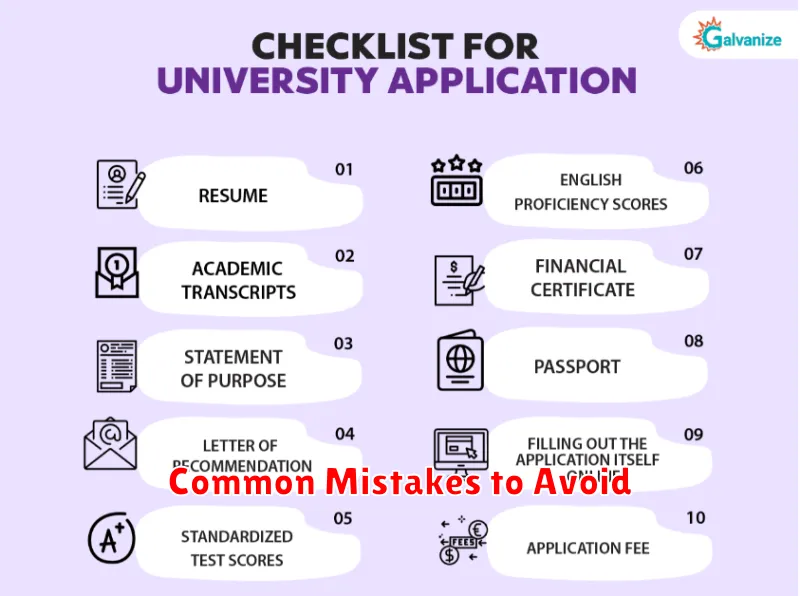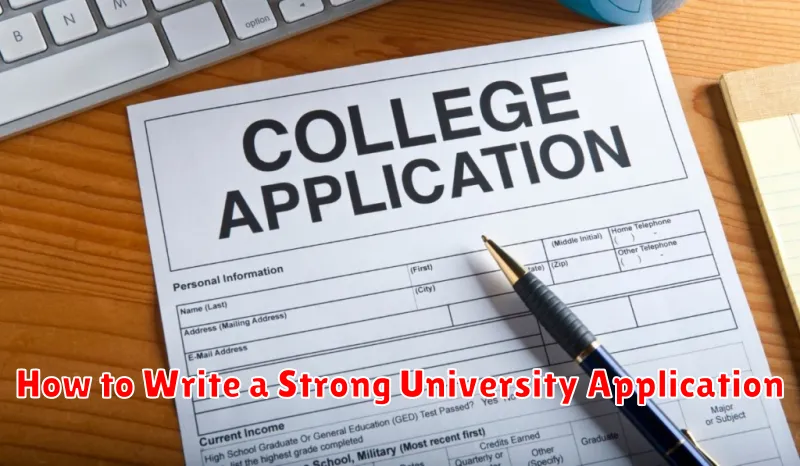Applying to university is a crucial step towards your future. A strong university application can be the key to unlocking opportunities and achieving your academic goals. This article will provide a comprehensive guide on how to craft a compelling application that showcases your strengths and increases your chances of acceptance into your dream university. We’ll cover essential aspects of the application process, including writing a standout personal statement, securing strong letters of recommendation, and highlighting your extracurricular activities. Learn how to navigate the complexities of university applications and present yourself as the ideal candidate.
From understanding application requirements to crafting a compelling narrative, we’ll delve into the intricacies of each component of a successful university application. Whether you’re aiming for a competitive program or seeking financial aid, this guide will equip you with the knowledge and tools to present a cohesive and persuasive application. Discover how to make your application stand out from the competition and secure your place at the university of your choice.
Understanding the Admissions Criteria
Gaining admission to your desired university involves more than just submitting an application. It requires a strategic understanding of the admissions criteria employed by each institution. Academic performance, reflected in your GPA and standardized test scores (like the SAT or ACT), forms the foundation of your application.
Beyond academics, universities seek well-rounded individuals. Therefore, your extracurricular activities, leadership roles, and community involvement are highly valued. These demonstrate your commitment, passion, and ability to contribute to the campus community. Letters of recommendation provide further insight into your character and abilities, so choose recommenders who can speak to your strengths effectively.
Finally, the application essay offers a crucial opportunity to showcase your personality, experiences, and aspirations. It allows you to connect with the admissions committee on a personal level and articulate why you are a good fit for their institution. Understanding these key components of the admissions process is essential for crafting a compelling application.
Writing a Personal Statement

Your personal statement is a critical component of your university application. It provides the admissions committee with insight into who you are beyond grades and test scores. It’s your opportunity to showcase your personality, experiences, and aspirations, demonstrating why you are a good fit for their institution.
Key elements to include are your academic interests, relevant extracurricular activities, any significant life experiences, and your future goals. Be genuine and reflective. Avoid clichés and focus on specific examples that illustrate your qualities and motivations.
Structure your statement effectively. Begin with a compelling introduction that grabs the reader’s attention. Develop your narrative logically, connecting your experiences to your academic pursuits. Conclude by reiterating your enthusiasm for the program and the university.
Careful proofreading and editing are essential. Ensure your statement is free of grammatical errors and typos. Ask a trusted teacher, mentor, or counselor to review your statement for clarity and impact before submitting it.
Getting Strong Recommendation Letters
Recommendation letters play a vital role in your university application. They offer an external perspective on your abilities, character, and potential. Securing strong letters requires thoughtful planning and preparation.
Choosing the Right Recommenders: Select individuals who know you well and can speak to your strengths. This might include teachers, counselors, or mentors who have observed your academic performance, extracurricular involvement, or leadership qualities.
Providing Recommenders with Information: Equip your recommenders with the materials they need to write a compelling letter. This might include your transcript, resume, or a brief statement of your academic goals. Discuss your aspirations with them and remind them of specific instances where you demonstrated key skills or qualities.
Requesting Letters Early: Give your recommenders ample time to write a thoughtful letter. Requesting letters several weeks in advance is considered courteous and allows them to fit it into their schedule.
Following Up and Expressing Gratitude: After submitting your application, follow up with your recommenders to confirm receipt and thank them for their support. Expressing gratitude for their time and effort is essential.
Highlighting Extracurricular Achievements
Your extracurricular achievements demonstrate your interests, commitment, and skills beyond academics. Effectively showcasing these experiences can significantly strengthen your university application.
When describing your activities, focus on the impact you made and the skills you developed. Quantify your achievements whenever possible. For example, instead of saying “I was a member of the debate team,” say “As a member of the debate team, I competed in 10 regional tournaments and helped the team achieve a top 3 ranking.”
Prioritize quality over quantity. A few deeply engaging activities are more impressive than a long list of superficial involvements. Highlight leadership roles, significant accomplishments, and long-term commitments.
Consider using a table to concisely present your extracurricular activities. This allows for easy readability and comparison of your involvements.
| Activity | Role | Duration | Key Achievements |
|---|---|---|---|
| Example Activity | Example Role | Example Duration | Example Achievement |
Proofreading and Application Review
Thorough proofreading is crucial for a strong application. Errors in grammar, spelling, and punctuation can create a negative impression, suggesting a lack of attention to detail. Review every section of your application multiple times.
Consider having someone else review your application. A fresh perspective can catch errors you may have overlooked. Ask a teacher, counselor, or trusted friend to provide feedback on clarity, conciseness, and overall impact.
Key areas to focus on during review:
- Consistency: Ensure your application materials present a consistent narrative and reflect your genuine self.
- Clarity: Is your writing clear, concise, and easy to understand? Avoid jargon and overly complex sentences.
- Completeness: Double-check that you have answered all required questions and included all necessary documents.
Give yourself ample time for this process. Rushing through proofreading can lead to missed errors. Ideally, complete your application a few days before the deadline to allow for thorough review and revisions.
Meeting Deadlines and Submission Requirements
Meeting deadlines is critical in the university application process. Missing a deadline can disqualify your application, regardless of its strength. Pay close attention to each university’s specific deadlines, as they can vary.
Application requirements also differ between institutions. Some universities use a centralized application system, while others have their own portals. Carefully review the required materials for each program you’re applying to. This may include:
- Transcripts
- Letters of recommendation
- Standardized test scores
- Essays or personal statements
Ensure all documents are submitted in the correct format and by the specified deadline. Keep copies of everything you submit.
Common Mistakes to Avoid

Applying to university is a crucial step, and avoiding common pitfalls can significantly increase your chances of success. Overlooking application deadlines is a critical error. Always submit your materials well in advance.
Another frequent mistake is neglecting to proofread your application thoroughly. Grammatical errors and typos create a negative impression. Ensure your essays are polished and error-free.
Generic essays also weaken your application. Admissions committees seek authenticity. Tailor your essays to each university, highlighting your unique experiences and aspirations. Don’t simply recycle the same essay.
Finally, failing to follow specific instructions is a common oversight. Each university has unique requirements. Carefully review the application guidelines and ensure you adhere to them precisely.

